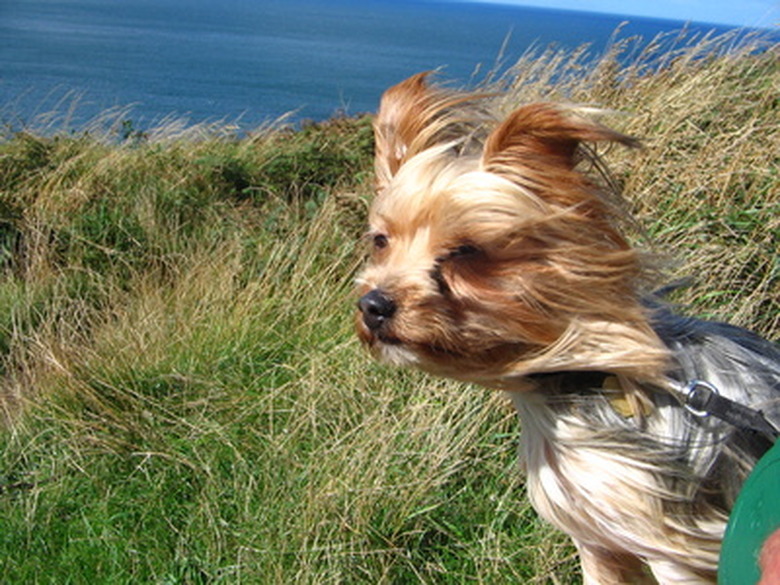Treatment For Coughing In Yorkie Dogs
If your Yorkshire terrier has suddenly developed a cough, it might be because of a viral or bacterial infection, allergies, a serious worm infestation, or trachea problems that are common to the breed. Unfortunately, a sudden cough can also be symptomatic of more serious pet health issues, including congestive heart failure, heart disease, or even cancerous lung disease. Clearly, proper treatment depends on the cause of your Yorkie dog's cough.
Treatment for allergies in Yorkshire terriers
Treatment for allergies in Yorkshire terriers
Yorkshire terriers are prone to allergies just like humans. Irritants such as dust, pollen, mold, insect bites, and even human dander can create an exaggerated immune response in your Yorkie, who might react by sneezing, coughing, honking, or scratching and chewing the skin around their paws. If you suspect your dog is suffering from allergies, take your pup to the veterinarian for evaluation.
Treatment for allergies includes anti-inflammatory cortisone or allergy shots and antihistamines as well as more modern anti-itch medications, such as Apoquel or Cytopoint. Some veterinarians might also recommend allergy testing and de-sensitization injections. Finally, avoidance of the irritant can help alleviate symptoms such as a persistent cough or honking.
Treatment for tracheal collapse in Yorkies
Treatment for tracheal collapse in Yorkies
If your Yorkie has developed a chronic, dry, hacking, or honking cough that seems to worsen when they are excited, they might be suffering from a collapsed trachea. This is not uncommon in small dog breeds that have small airways. The trachea of an affected dog is prone to collapse because it is soft and malleable instead of rigid — imagine a drinking straw that becomes soft and bent after use.
If you suspect that your Yorkie might have the beginnings of a collapsed trachea, take them to the veterinarian right away because tracheal collapse in dogs can worsen and lead to a complete cutting off of the dog's air supply. In severe cases, your veterinary surgeon might need to operate to correct the problem.
Treatment for reverse sneezing in Yorkies
Treatment for reverse sneezing in Yorkies
Reverse sneezing is a common form of coughing in Yorkies and other small-dog breeds. If your pet snorts, coughs in a way that sounds like honking, or seems unable to inhale normally when they get very excited, they might have a temporary blockage inside the canine nasal passage or swollen nasal membranes.
Pick up your dog and pet them to calm them. Once calm, your dog should be able to clear their nose and respiratory tract normally and resume regular breathing.
Treatment for kennel cough in Yorkies
Treatment for kennel cough in Yorkies
If your coughing Yorkie has recently been to the groomer, veterinarian, or an off-leash dog park or if they have been exposed to a sick dog in some other setting, your dog might have kennel cough, another name for tracheobronchitis. If you suspect kennel cough, you need to isolate your pup from other dogs because the malady is highly contagious. Then, monitor your dog's temperature and provide them with plenty of rest and fluids. Continue to monitor your dog's condition and watch to see if their cough either improves or progresses.
Your dog might require a visit to the veterinarian if the cough does not improve within 10 days. If you are certain your Yorkie puppy contracted kennel cough, take them to the veterinarian immediately because the condition can quickly lead to respiratory disease such as pneumonia if left untreated too long.
Treatment for parasites in Yorkies
Treatment for parasites in Yorkies
Internal parasites can cause coughing when roundworm larvae travel from the intestines to the lungs and then crawl into the windpipe. Heartworms can also cause a Yorkie and other small breeds like Chihuahuas to cough when larvae invade the lungs and bloodstream of the infected canine.
Treatment for parasites involves accurate diagnosis through blood tests and then de-worming medication and maintenance that must be administered by your veterinarian. In the case of heartworms, treatment can take months and can be hard on your dog because heartworm is a potentially life-threatening condition.
Treatment for canine distemper respiratory infection in Yorkies
Treatment for canine distemper respiratory infection in Yorkies
Canine distemper is a devastating life-threatening illness that has no medical cure. In the initial stages of the disease, a dog might cough colorful mucous or appear to have problems breathing. Treatment for distemper involves isolation, symptomatic relief, and careful monitoring by your DVM. This is true for all dog breeds, including Yorkshire terriers.
Unfortunately, approximately 50 percent of dogs with canine distemper will succumb to the disease. Because the symptoms of canine distemper can last for months and cause the dog great distress, euthanasia of affected dogs is not uncommon. Fortunately, there are vaccinations available that help prevent canine distemper respiratory infection and bolster a dog's immune system.
The bottom line
The bottom line
The treatment for Yorkshire Terrier coughing depends on what is causing the respiratory system irritation. The problem can range from those that are easily treatable to severe cases and often requires veterinary intervention. Some of the causes of dog coughing include allergies, which can be treated with anti-inflammatory medications; tracheal collapse, which seldom requires surgery except in severe cases; kennel cough or parasites such as heartworm, which require prescription medication; or canine distemper, which unfortunately has no treatment. Persistent cough in Yorkies needs to be treated quickly thanks to the small airway in this dog breed.
